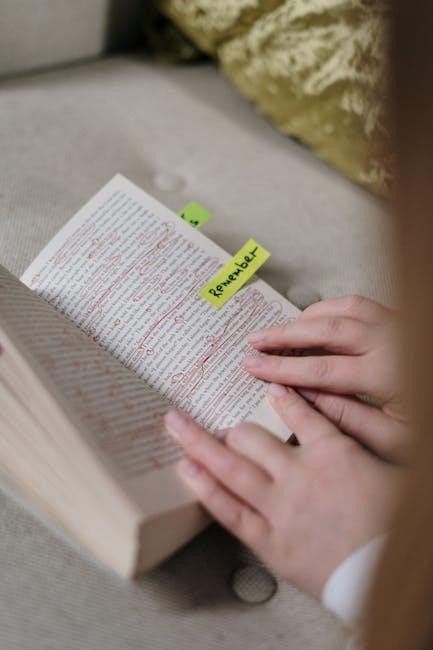MOEMS contests are math competitions designed for elementary and middle school students, focusing on problem-solving skills and teamwork. They emphasize practical applications of mathematical concepts to real-world challenges, fostering creativity and critical thinking.

Structure and Problem Types
MOEMS contests feature problem sets divided into categories, often including 20-30 questions per round. Problems emphasize practical applications of math and science, with a focus on critical thinking and creative problem-solving techniques.
2.1. Problem Difficulty Levels
MOEMS contest problems are categorized into distinct difficulty levels, ensuring suitability for various age groups and skill levels. Elementary school problems often focus on basic arithmetic, number theory, and logical reasoning, designed to build foundational skills. Middle school challenges introduce higher complexity, incorporating algebra, geometry, and combinatorics, preparing students for advanced competitions. The problems are carefully calibrated to gradually increase in difficulty, allowing participants to progress and improve their abilities. This structured approach ensures that each student is appropriately challenged, fostering growth and engagement in mathematical problem-solving. The tiered difficulty levels also enable educators to track student progress effectively, making MOEMS contests a valuable tool for both learning and assessment. By offering problems that span a range of difficulty, MOEMS contests cater to a diverse range of learners, promoting inclusivity and excellence in mathematics education.
2.2. Time Management Tips
Effective time management is crucial for success in MOEMS contests, as students must solve problems within a limited timeframe. A recommended strategy is to skim through all questions first to identify easier problems and tackle them immediately, reserving more time for challenging ones. For multiple-choice questions, eliminating obviously incorrect answers can save valuable seconds. Allocating specific time slots for each problem, such as 5 minutes for simpler ones and 7 minutes for more complex tasks, helps maintain momentum and reduces stress. Practicing under timed conditions during preparation is essential to build speed and accuracy. Additionally, students should avoid spending too long on a single problem, as this can jeopardize their ability to attempt others. By prioritizing problems strategically and adhering to a time plan, participants can maximize their scores and perform at their best. Regular practice with sample problems is key to refining these skills.

Sample Problems from Past Contests
Past MOEMS contests feature a variety of math problems, such as determining the number of nickels Pablo has or solving geometry puzzles. These problems cover topics like algebra, geometry, and combinatorics, enhancing critical thinking and problem-solving skills.
3.1. Elementary School Level Problems
Elementary school level problems in MOEMS contests are designed to introduce young students to mathematical problem-solving in an engaging and accessible way. These problems typically focus on basic arithmetic, number operations, and simple geometry, with a emphasis on logical thinking and creativity. For example, past contests have included questions like determining the number of nickels Pablo has if he has five more dimes than nickels and a total of $1.40. Such problems are crafted to be solvable within a few minutes, encouraging students to think critically and systematically. They also cover topics like patterns, shapes, and basic algebra, providing a strong foundation for higher-level math concepts. The problems are often presented in real-world contexts, making them relatable and fun for young participants. By solving these challenges, students develop essential skills in problem analysis, calculation, and confidence in their mathematical abilities.
3.2. Middle School Level Challenges
Middle school level challenges in MOEMS contests are designed to test more advanced problem-solving skills, building on the foundational concepts introduced at the elementary level. These problems often involve algebra, geometry, and more complex arithmetic, requiring students to think critically and apply mathematical principles to real-world scenarios. For instance, challenges may involve solving algebraic equations, interpreting geometric shapes, or tackling multi-step arithmetic problems. The difficulty level is higher, but the problems remain solvable within a similar time frame of 4-7 minutes, encouraging efficient and precise thinking. Middle school challenges also incorporate themes like patterns, ratios, and proportions, preparing students for higher-level math competitions. Resources such as the “MOEMS Contest Problems Volume 3” provide ample practice material, including hundreds of problems and hints to guide students in refining their problem-solving strategies.

Resource Books for Preparation
Notable volumes like “MOEMS Contest Problems Volume 3” offer comprehensive practice materials, featuring hundreds of problems, hints, and solutions. These books are designed to help students refine their problem-solving skills and prepare effectively for contests.
4.1. Notable Volumes and Their Features
Notable volumes such as MOEMS Contest Problems Volume 3 are highly regarded for their comprehensive collection of problems. Edited by experts like Richard Kalman and Nicholas J. Restivo, these books feature over 400 problems, divided into categories suitable for different skill levels. Each problem is accompanied by detailed solutions, often providing multiple approaches to foster deeper understanding. Additionally, many volumes include hints sections, which guide students through challenging questions without giving away answers. These books are structured to align with the difficulty levels of MOEMS contests, ensuring targeted practice. The inclusion of problems from past contests makes them invaluable for familiarizing students with the competition format. Overall, these resources are designed to enhance problem-solving skills, encourage creative thinking, and build confidence for participants.

Common Challenges and Strategies
Common challenges include time management and complex problem setups. Strategies involve breaking problems into smaller steps, utilizing hints, and practicing under timed conditions to enhance speed and accuracy.
5.1. Recurring Themes in Problems
Recurring themes in MOEMS problems often involve number theory, algebra, geometry, and practical applications. Common problem types include coin problems, mixture challenges, and age-related scenarios. These questions frequently require logical reasoning and creative approaches. Students often encounter problems involving ratios, proportions, and sequences, which test their ability to break down complex scenarios into manageable steps. Additionally, problems may incorporate real-world contexts, such as financial calculations or measurement conversions, to enhance problem-solving skills. Many questions are designed to encourage critical thinking and the application of multiple mathematical concepts simultaneously. By analyzing these recurring themes, students can better prepare for the types of challenges they will face in MOEMS contests, improving their overall performance and confidence.
MOEMS contests offer a valuable platform for students to enhance their mathematical skills, fostering creativity, critical thinking, and teamwork. By engaging with these challenges, participants develop problem-solving strategies and gain confidence in applying mathematical concepts to real-world scenarios. The availability of resource books, past problems, and study materials provides ample opportunities for preparation. Emphasizing recurring themes and common challenges helps students refine their approaches and improve performance. MOEMS contests are not just about winning but about nurturing a deep understanding of mathematics and its practical applications. Encouraging students to embrace these challenges can lead to lifelong learning and a passion for problem-solving. With dedication and practice, participants can unlock their full potential and excel in mathematical competitions. MOEMS contests remain a rewarding experience for students, educators, and the broader mathematical community.




